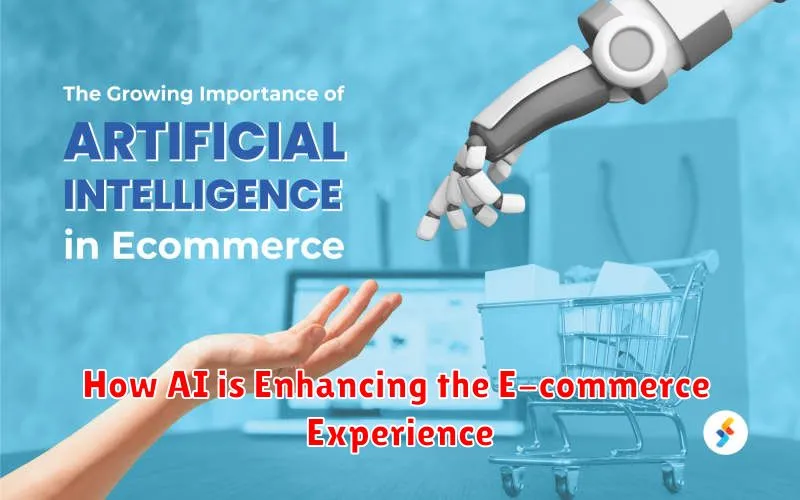The rapid rise of artificial intelligence (AI) is revolutionizing industries worldwide, and e-commerce is no exception. From personalized product recommendations to intelligent chatbots, AI is transforming the way businesses interact with customers and drive sales. This article delves into the latest advancements in AI and explores its profound impact on the e-commerce landscape.
As AI technology continues to evolve at an unprecedented pace, its applications in e-commerce are expanding exponentially. From predictive analytics to fraud detection, AI is empowering businesses to optimize their operations and enhance the customer experience. We will examine the most recent trends and innovations in AI-powered e-commerce, highlighting the key benefits and challenges for businesses and consumers alike.
How AI is Enhancing the E-commerce Experience

Artificial intelligence (AI) is rapidly transforming the e-commerce landscape, offering businesses innovative ways to enhance customer experiences and drive growth. From personalized recommendations to automated customer service, AI is revolutionizing how consumers interact with online retailers.
One of the most significant ways AI is enhancing the e-commerce experience is through personalized recommendations. By analyzing customer data, AI algorithms can identify individual preferences and suggest products tailored to their needs. This personalized approach increases customer satisfaction and drives conversions, as shoppers are more likely to purchase products they are genuinely interested in.
AI is also transforming customer service in e-commerce. Chatbots powered by AI can provide instant support to customers, answering common questions and resolving simple issues without the need for human intervention. This automated approach not only improves response times but also frees up human agents to handle more complex inquiries.
Another key area where AI is making a difference is search optimization. AI-powered search engines can understand complex search queries and provide relevant results, even when customers use unconventional language. This improved search functionality helps customers find what they’re looking for quickly and efficiently.
AI is also enabling e-commerce businesses to optimize pricing and inventory management. By analyzing market trends and customer demand, AI algorithms can dynamically adjust prices to maximize profitability. They can also predict inventory needs, minimizing stockouts and reducing waste.
In conclusion, AI is playing a transformative role in enhancing the e-commerce experience. By leveraging AI technologies, businesses can personalize recommendations, automate customer service, optimize search results, and improve pricing and inventory management. As AI continues to evolve, we can expect even more innovative applications that will further revolutionize the e-commerce landscape.
The Role of AI in Personalized Shopping
The world of e-commerce is rapidly evolving, driven by the ever-increasing adoption of artificial intelligence (AI). Among the most transformative applications of AI in e-commerce is personalized shopping. AI empowers businesses to understand their customers better, delivering tailored experiences that resonate with individual preferences and needs.
One key aspect of AI-powered personalization is product recommendations. By analyzing past purchase history, browsing behavior, and other data points, AI algorithms can predict which products a customer is most likely to be interested in. This leads to relevant recommendations that enhance the shopping experience and drive conversions.
Another crucial area is dynamic pricing. AI enables e-commerce platforms to adjust prices in real-time based on factors like demand, inventory levels, and customer behavior. This dynamic pricing strategy optimizes revenue while providing customers with competitive offers.
Beyond recommendations and pricing, AI also plays a vital role in customer service. AI-powered chatbots and virtual assistants provide instant support, answering queries and resolving issues efficiently. This improves customer satisfaction and reduces the workload on human agents.
The impact of AI on personalized shopping is undeniable. By leveraging AI, e-commerce businesses can create more engaging and efficient experiences for customers, fostering loyalty and driving business growth. As AI technology continues to advance, we can expect even more innovative applications that will revolutionize the way we shop online.
Future Trends in AI-Powered E-commerce
Artificial intelligence (AI) is revolutionizing the e-commerce landscape, offering a plethora of opportunities for businesses to enhance their customer experience, optimize operations, and drive growth. As AI technology continues to evolve, we can expect to see even more innovative applications in e-commerce, shaping the future of online shopping. Here are some of the key trends to watch:
Personalized Shopping Experiences: AI will play a pivotal role in delivering highly personalized shopping experiences. By analyzing customer data, AI-powered recommendation engines will become more sophisticated, suggesting products that perfectly align with individual preferences, browsing history, and purchase behavior. This will lead to increased customer satisfaction and conversion rates.
Conversational Commerce: Chatbots and virtual assistants powered by AI will become increasingly prevalent in e-commerce, providing 24/7 customer support, answering questions, and guiding shoppers through the purchase process. These intelligent assistants will understand natural language, personalize interactions, and offer seamless customer service, enhancing the overall shopping experience.
Predictive Analytics for Inventory Management: AI-powered predictive analytics will revolutionize inventory management, enabling businesses to anticipate demand fluctuations and optimize stock levels. By analyzing historical data, market trends, and consumer behavior, AI algorithms can accurately forecast future demand, reducing stockouts and overstocking, and improving operational efficiency.
AI-Driven Fraud Detection: AI will be crucial in combatting fraudulent activities in e-commerce. By analyzing transaction patterns, user behavior, and other data points, AI algorithms can detect suspicious activities and prevent fraudulent transactions, protecting businesses and customers from financial losses.
Augmented Reality and Virtual Reality: AI will power immersive shopping experiences through augmented reality (AR) and virtual reality (VR). Customers will be able to visualize products in their own homes, try on clothes virtually, and explore online stores in interactive 3D environments, enhancing product discovery and customer engagement.
The future of e-commerce is bright with AI. By embracing these trends, businesses can leverage the power of AI to enhance customer experiences, optimize operations, and stay ahead of the competition in the ever-evolving digital landscape.
Challenges in Implementing AI in Online Retail
While AI promises to revolutionize e-commerce, its implementation faces several challenges. One significant hurdle is data quality and availability. AI algorithms require vast amounts of high-quality data to train effectively. E-commerce companies often struggle with incomplete, inaccurate, or siloed data, hindering AI’s effectiveness.
Another challenge lies in algorithmic bias. AI algorithms can perpetuate existing biases present in the data they are trained on. This can result in unfair or discriminatory outcomes, such as biased product recommendations or unfair pricing.
Transparency and explainability are crucial for trust and accountability. AI models often operate as “black boxes,” making it difficult to understand their decision-making processes. This lack of transparency can lead to distrust and hinder user acceptance.
Cost and technical expertise are also major obstacles. Implementing and maintaining AI systems can be expensive, requiring specialized skills and infrastructure. Smaller retailers may face challenges in accessing these resources.
Finally, regulatory and ethical considerations are increasingly important. Concerns surrounding data privacy, algorithmic fairness, and the potential displacement of jobs require careful consideration and robust ethical frameworks.
AI in Customer Service: Chatbots and Beyond
The rise of e-commerce has dramatically altered customer expectations, demanding speed, efficiency, and personalized experiences. AI has emerged as a game-changer in this landscape, transforming how businesses engage with customers, particularly in the realm of customer service. While chatbots have become ubiquitous, the impact of AI extends far beyond these automated conversational agents.
AI-powered customer service solutions are now tackling complex challenges, offering a range of benefits:
- 24/7 Availability: AI-powered systems operate tirelessly, providing instant responses and support, even outside traditional business hours.
- Personalized Experiences: AI can analyze customer data to tailor interactions, offering personalized recommendations, and proactive assistance.
- Enhanced Efficiency: By automating repetitive tasks, AI frees up human agents to focus on more complex issues, improving overall efficiency and reducing wait times.
- Data-Driven Insights: AI gathers valuable data on customer interactions, providing insights into pain points and areas for improvement, enabling businesses to optimize their services.
Beyond chatbots, AI is driving innovations in customer service:
- Virtual Assistants: Advanced AI-powered assistants can handle complex tasks, such as booking appointments or resolving technical issues, providing a seamless and intuitive experience.
- Sentiment Analysis: AI can analyze customer feedback, including social media posts and reviews, to gauge sentiment and identify areas for improvement.
- Predictive Maintenance: AI can predict potential issues with products and services, allowing businesses to proactively address problems before they impact customers.
The adoption of AI in customer service is rapidly expanding, empowering businesses to deliver exceptional experiences and build stronger customer relationships. As technology advances, we can expect even more sophisticated and personalized AI-driven solutions to emerge, shaping the future of e-commerce.
Case Studies: AI-Driven E-commerce Solutions

The application of Artificial Intelligence (AI) is transforming the e-commerce landscape. AI empowers businesses to enhance customer experiences, optimize operations, and achieve significant growth. Here are some compelling case studies that highlight the transformative power of AI in e-commerce:
Amazon leverages AI extensively for personalization and recommendations. Its sophisticated algorithms analyze vast amounts of data to predict customer preferences and suggest relevant products, leading to increased sales and customer satisfaction.
Netflix uses AI for content recommendation and personalization. Its algorithm analyzes user viewing habits and preferences to suggest movies and TV shows tailored to individual tastes, driving user engagement and subscription renewals.
Alibaba employs AI for fraud detection and prevention. Its AI-powered system analyzes transaction patterns and user behavior to identify and mitigate fraudulent activities, safeguarding both customers and businesses.
Stitch Fix utilizes AI for personalized styling services. Its algorithm analyzes customer style preferences, body measurements, and other data to curate personalized clothing recommendations, providing a highly customized shopping experience.
These case studies demonstrate the tangible benefits of AI in e-commerce. By leveraging AI, businesses can achieve greater efficiency, enhance customer experiences, and unlock new growth opportunities.

